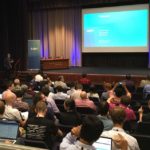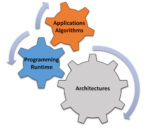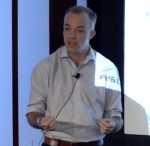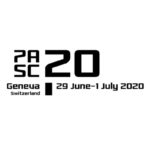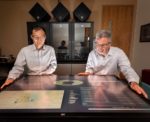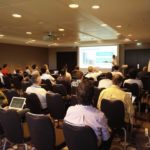The DOE’s national laboratories will be showcased at SC19 next week in Denver, CO. “Computational scientists from DOE laboratories have been involved in the conference since it began in 1988 and this year’s event is no different. Experts from the 17 national laboratories will be sharing a booth featuring speakers, presentations, demonstrations, discussions, and simulations. DOE booth #925 will also feature a display of high performance computing artifacts from past, present and future systems. Lab experts will also contribute to the SC19 conference program by leading tutorials, presenting technical papers, speaking at workshops, leading birds-of-a-feather discussions, and sharing ideas in panel discussions.”
DOE Funds Center for Artificial Intelligence-focused Architectures and Algorithms
Sandia National Laboratories, PNNL, and the Georgia Institute of Technology are launching a research center that combines hardware design and software development to improve artificial intelligence technologies that will ultimately benefit the public. “The center will focus on the most challenging basic problems facing the young field, with the intention of speeding advances in cybersecurity, electric grid resilience, physics and chemistry simulations and other DOE priorities.”
NNSA Explorations: ARM for Supercomputing
Howard Pritchard from LANL and Simon Hammond from Sandia gave this talk at the Argonne Training Program on Extreme-Scale Computing 2019. “Sandia National Laboratories has been an active partner in leveraging our Arm-based platform since its early design, and featuring it in the deployment of the world’s largest Arm-based supercomputer, is a strategic investment for the DOE and the industry as a whole as we race toward achieving exascale computing.”
Call for Submissions: PASC20 in Geneva
The PASC20 conference has issued its Call for Submissions. The event takes place June 29 – July 1, 2020 in Geneva, Switzerland. “PASC20 is an international and interdisciplinary platform for the exchange of competences in scientific computing and computational science, with a strong focus on methods, tools, algorithms, application challenges, and novel techniques and usage of high performance computing.”
Energy Exascale Earth System Model to Accelerate Climate Research
As one of the Grand Challenges of our time, climate modeling typically requires long run times and huge computational resources. Sandia National Laboratories has awarded Kelsey DiPietro a Jill Hruby Fellowship to tackle this issue. As an applied mathematician, DiPietro has proposed a way to make computer models more efficient — improving accuracy without increasing time or resources to run them.
Sandia Research Project turns Big Data into real-time, actionable intelligence
Researchers at Sandia National Labs are leading a project to deliver actionable information from streaming data to decision makers. While social media, cameras, sensors and more generate huge amounts of data that can overwhelm analysts, the project looks to provide crucial insight in real time. “Actionable intelligence is the next level of data analysis where analysis is put into use for near-real-time decision-making. Success on this research will have a strong impact to many time-critical national security applications.”
Why PASC19 is a great show for the International Science Community
In this video from PASC19 in Zurich, Mike Heroux from Sandia National Labs shares the reasons he attends the conference every year. As a multi-disciplinary show, PASC gives him the opportunity to keep up with the international science community. “PASC19 is the sixth edition of the PASC Conference series, an international platform for the exchange of competences in scientific computing and computational science, with a strong focus on methods, tools, algorithms, application challenges, and novel techniques and usage of high performance computing.”
Epic HPC Road Trip Continues to Sandia National Lab
In this special guest feature, Dan Olds from OrionX continues his Epic HPC Road Trip series with a stop at Sandia National Laboratories in New Mexico. “Ken discussed how Sandia is hoping to stimulate more of a system-on-a-chip type of technology where extra CPU real estate might be better utilized for better HPC componentry and customization.”
Agenda Posted: Exacomm 2019 Workshop at ISC High Performance
“The goal of this workshop is to bring together researchers and software/hardware designers from academia, industry and national laboratories who are involved in creating network-based computing solutions for extreme scale architectures. The objectives of this workshop will be to share the experiences of the members of this community and to learn the opportunities and challenges in the design trends for exascale communication architectures.”


